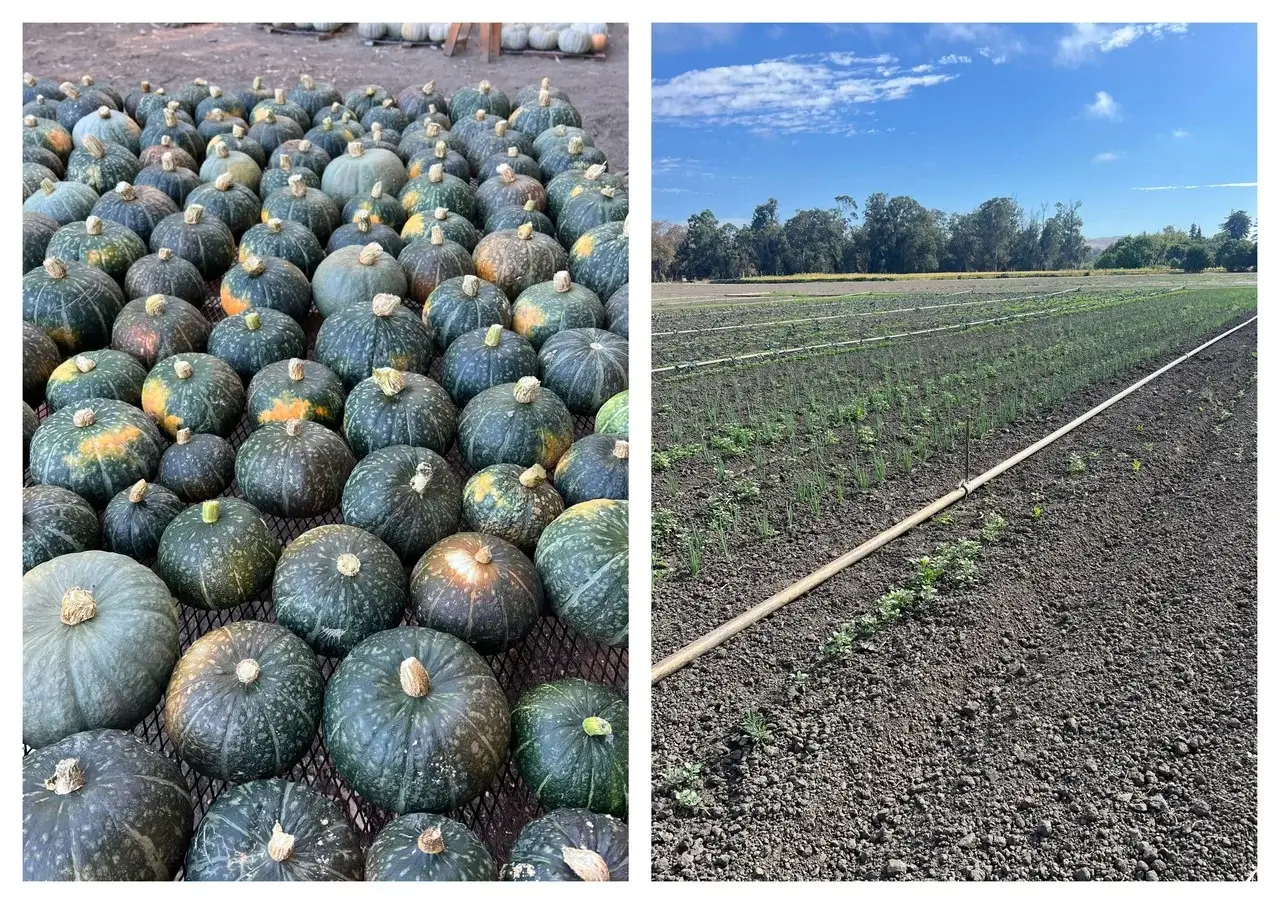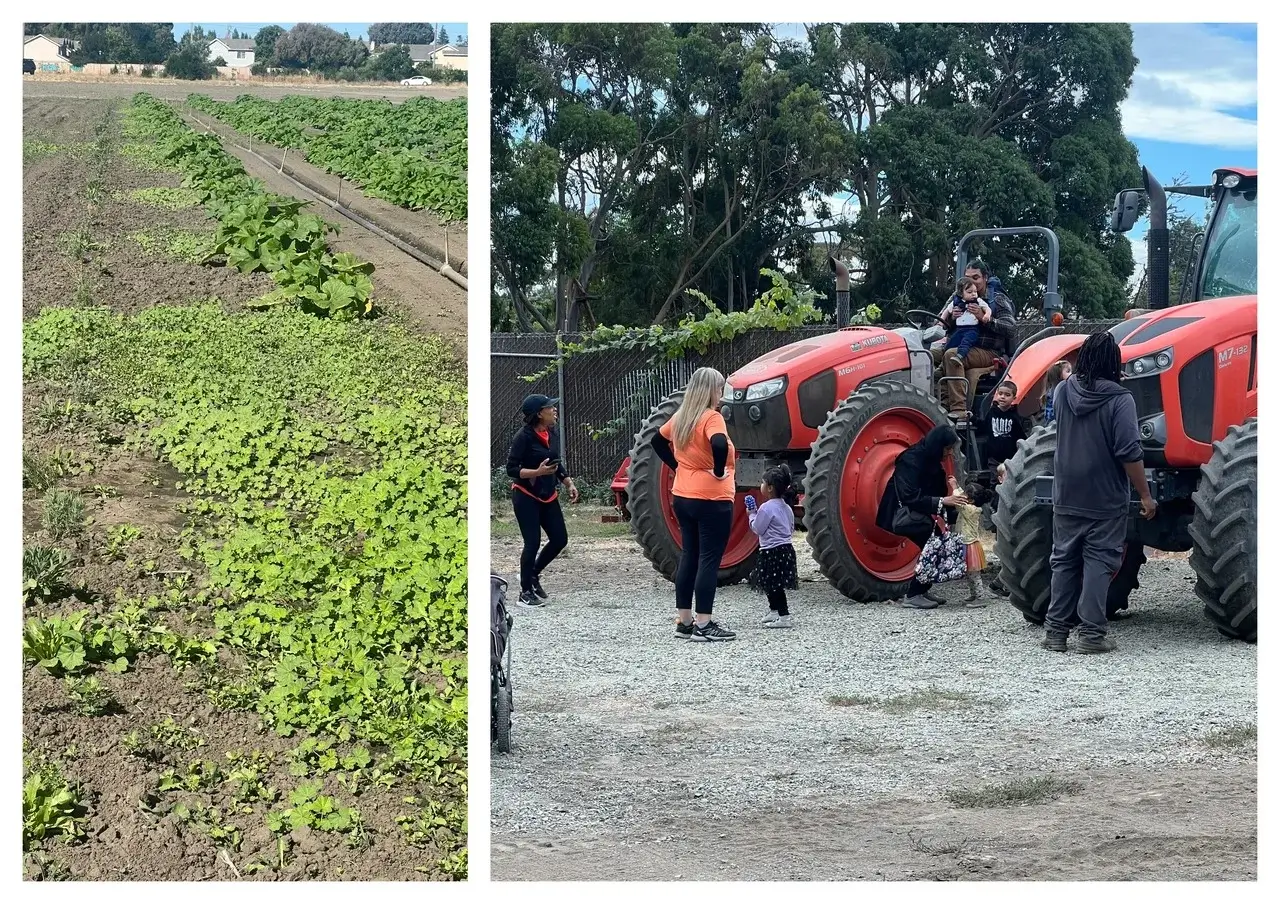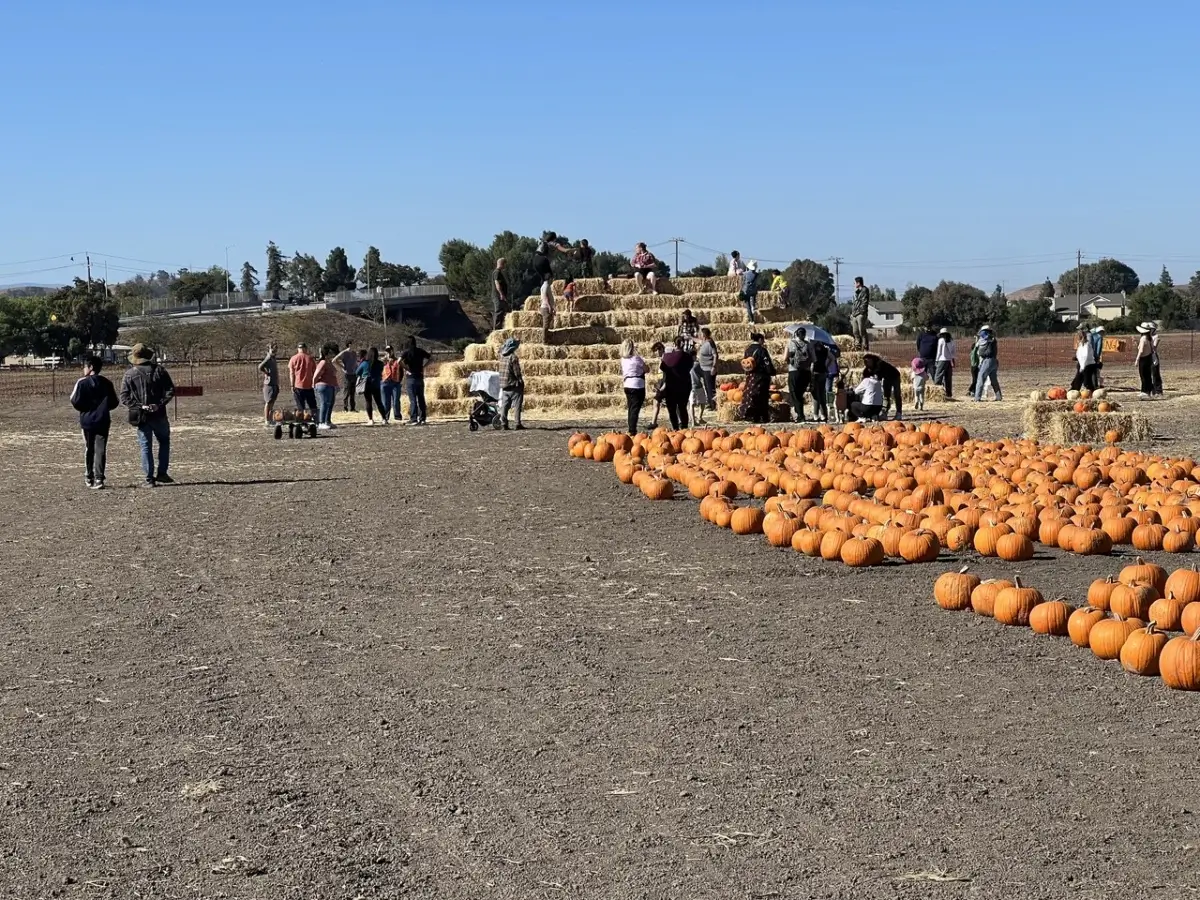The Farm and the Food Bank
An unlikely partnership aims to strengthen the local food system in California’s Alameda County.
Located on the eastern side of the San Francisco Bay sits Alameda County, where Dig Deep Farms’ two farm sites grow rows and rows of fresh food. Dig Deep Farms is a Black-led and BIPOC nonprofit organic farming operation that serves the community with its harvests and its commitment to providing economically viable jobs and careers in farming.
“Farming in America in particular, but also commercially and globally, it’s based on exploitation and making as much money for as little as you can pay. And we have to turn that around in a big way,” says Sasha Shankar, one of the farm directors.
Our food system relies on the security of small farms, but these farms face many obstacles—including land access, access to business resources, and access to buyers. To counter those challenges, Dig Deep Farms has entered into a partnership with the Alameda County Community Food Bank (ACCFB) as a way to accomplish its goals. For the next two to three years, ACCFB will provide institutional support, such as assuming the lease agreements for the farm locations. This will allow Dig Deep Farms to focus on growing a sustainable business, one that will stand on its own in just a few years.
Shifting priorities
Many people think of food banks as a place simply to get a meal. But in the several decades that the Alameda County Community Food Bank has been in operation, the organization has moved beyond hunger relief to addressing poverty systemically.
READ MORE
On the ground with grocery stores changing the way we shop.
“ACCFB has a long history of not addressing hunger in a vacuum or addressing food insecurity in a transactional way, but really wanting to look at those root causes and think about how we can offer solutions to hunger at that root cause level,” says Allison Pratt, chief of strategy and partnerships for ACCFB. “We took a look at how much money we were spending each year on food…and we realized that where we placed those dollars actually does make a difference in the food system.”
“One of the frames that we’re working with as a food bank is our desire to move from a kind of food charity model, or exclusively a food charity model, to a food justice model,” says Susie Wise, ACCFB director of strategy. “Our understanding of where our food comes from, who grows it, who has resources in order to become farmers—these are aspects of bringing a food justice lens to our work.”

For them, this manifests in several different ways—for example, ACCFB team members went to Washington D.C. to lobby Congress for anti-hunger policies in the Farm Bill. Now, they are also investing in a farm that they see doing important work to strengthen the food system.
Dig Deep Farms was cofounded in 2010 as a social enterprise project by Martin Neideffer Hilary Bass. The farm’s mission has stretched beyond the act of growing food, to strengthening the community’s food system. For example, it has been a part of the local food as medicine initiative Recipe4Health, which integrates food into the treatment and prevention of chronic illness. One of Dig Deep Farms’ key ongoing priorities is paying employees a living wage and providing similar benefits to other jobs, to make farming a viable profession.
“One of the reasons why folks are not entering the field, they’re hearing [there’s] no money to be made,” says Troy Horton, one of the farm directors. “They can’t make a living. It’s backbreaking work. And then if we go to those historically underserved, underrepresented folks, it’s even more grim. One of the things. Our primary focus was trying to create a real living wage for folks doing it.”

For the next few years, ACCFB will “incubate” Dig Deep Farms by assuming the lease agreements of Dig Deep Farms’ two farm sites, plus providing logistical, human resource, and financial support.
While a partnership between a farm and a food bank is not common, this partnership can become an example for others.
“The incubator concept invites food banks to consider that question—what does it take to end hunger, in addition to continuing to grow food banks? What are the other pieces of our food system that are going to be vital if we’re actually going to achieve our mission?” says Pratt. “Supporting farmers and supporting equity in how our food is produced, creating economic activity through those channels, all helps to create a system where people have access to what they need.”
Horton points out that one of the big obstacles facing small farmers is the lack of support they get in comparison to large commodity crop farmers. Finding pathways to support, through partnerships, grants, and more, can strengthen small farms.
“That’s what we’re always preaching—us urban farmers or small farmers need to be subsidized, just like the big farmers,” says Horton.
Follow us
This work is licensed under a Creative Commons Attribution-NoDerivatives 4.0 International License.
Want to republish a Modern Farmer story?
We are happy for Modern Farmer stories to be shared, and encourage you to republish our articles for your audience. When doing so, we ask that you follow these guidelines:
Please credit us and our writers
For the author byline, please use “Author Name, Modern Farmer.” At the top of our stories, if on the web, please include this text and link: “This story was originally published by Modern Farmer.”
Please make sure to include a link back to either our home page or the article URL.
At the bottom of the story, please include the following text:
“Modern Farmer is a nonprofit initiative dedicated to raising awareness and catalyzing action at the intersection of food, agriculture, and society. Read more at <link>Modern Farmer</link>.”
Use our widget
We’d like to be able to track our stories, so we ask that if you republish our content, you do so using our widget (located on the left hand side of the article). The HTML code has a built-in tracker that tells us the data and domain where the story was published, as well as view counts.
Check the image requirements
It’s your responsibility to confirm you're licensed to republish images in our articles. Some images, such as those from commercial providers, don't allow their images to be republished without permission or payment. Copyright terms are generally listed in the image caption and attribution. You are welcome to omit our images or substitute with your own. Charts and interactive graphics follow the same rules.
Don’t change too much. Or, ask us first.
Articles must be republished in their entirety. It’s okay to change references to time (“today” to “yesterday”) or location (“Iowa City, IA” to “here”). But please keep everything else the same.
If you feel strongly that a more material edit needs to be made, get in touch with us at [email protected]. We’re happy to discuss it with the original author, but we must have prior approval for changes before publication.
Special cases
Extracts. You may run the first few lines or paragraphs of the article and then say: “Read the full article at Modern Farmer” with a link back to the original article.
Quotes. You may quote authors provided you include a link back to the article URL.
Translations. These require writer approval. To inquire about translation of a Modern Farmer article, contact us at [email protected]
Signed consent / copyright release forms. These are not required, provided you are following these guidelines.
Print. Articles can be republished in print under these same rules, with the exception that you do not need to include the links.
Tag us
When sharing the story on social media, please tag us using the following: - Twitter (@ModFarm) - Facebook (@ModernFarmerMedia) - Instagram (@modfarm)
Use our content respectfully
Modern Farmer is a nonprofit and as such we share our content for free and in good faith in order to reach new audiences. Respectfully,
No selling ads against our stories. It’s okay to put our stories on pages with ads.
Don’t republish our material wholesale, or automatically; you need to select stories to be republished individually.
You have no rights to sell, license, syndicate, or otherwise represent yourself as the authorized owner of our material to any third parties. This means that you cannot actively publish or submit our work for syndication to third party platforms or apps like Apple News or Google News. We understand that publishers cannot fully control when certain third parties automatically summarize or crawl content from publishers’ own sites.
Keep in touch
We want to hear from you if you love Modern Farmer content, have a collaboration idea, or anything else to share. As a nonprofit outlet, we work in service of our community and are always open to comments, feedback, and ideas. Contact us at [email protected].by Lena Beck, Modern Farmer
November 4, 2024
Modern Farmer Weekly
Solutions Hub
Innovations, ideas and inspiration. Actionable solutions for a resilient food system.
ExploreExplore other topics
Share With Us
We want to hear from Modern Farmer readers who have thoughtful commentary, actionable solutions, or helpful ideas to share.
SubmitNecessary cookies are absolutely essential for the website to function properly. This category only includes cookies that ensures basic functionalities and security features of the website. These cookies do not store any personal information.
Any cookies that may not be particularly necessary for the website to function and are used specifically to collect user personal data via analytics, ads, other embedded contents are termed as non-necessary cookies.

Horton points out that one of the big obstacles facing small farmers is the lack of support they get in comparison to large commodity crop farmers.
The partnership can serve as an example for other food banks and farms to work together to strengthen local food systems and create viable farming careers.